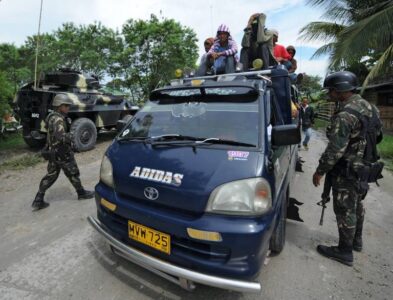
Islamic State-linked terrorists attack town in Philippines
Islamic State-inspired militants in the Philippines attacked a town in Maguindanao province on Thursday night, terrorizing residents and bringing back memories of the Marawi siege three years ago on the southern island of Mindanao.
Under the cover of darkness, reports said about 50 heavily armed members of the Bangsamoro Islamic Freedom Forces (BIFF) occupied the center of Datu Piang town, formerly called Dulawan, once the seat of power and commerce for Muslims in that part of the country in the early 1900s.
“Dulawan, Datu Piang is now like Marawi. ISIS-inspired BIFF attacked the town center,” Datu Zamzamin Ampatuan, a senior executive at the Philippines’ Department of Agriculture, posted on social media at 10:34pm on Thursday.
An army company stationed in the municipality and the town’s small police force repelled the attack until back-up forces arrived, prompting the militants to withdraw an hour later.
In 2008, tens of thousands of people sought shelter at the town center of Datu Piang after fighting broke out between government forces and the Moro Islamic Liberation Front (MILF) after the signing of the Memorandum of Agreement on Ancestral Domain between the two parties, which the Supreme Court ruled as unconstitutional.
The signing eventually led some MILF leaders to break away from the front and in 2010 they formed the BIFF, which has broken into three factions in the past few years. The one which attacked on Thursday earlier pledged allegiance to the Islamic State.
The militants, still the subject of military manhunt operations, left the town after burning police property and terrifying the population.
There were no reports of casualties.
Ampatuan said the town was back to normal on Friday morning. The Islamic call to prayer was heard from mosques and the town’s only Catholic church remained standing. The fear had passed but people had mixed feelings.
The militants claimed to have burned the church and the only Catholic-run school in the town, which turned out to be false when troops regained control of the area as dawn broke.
While the latest Islamist attack in Maguindanao, an area claimed by the MILF, was not as fierce and prolonged as the five-month Marawi siege, it showed that Islamic State still has clout in the autonomous Muslim region.
Rommel Banlaoi, chairman of the Philippine Institute for Peace, Violence and Terrorism Research think tank, said the defeat in Marawi did not mean the Islamic State militants were down and out in the Philippines.
“The attack in Datu Piang by pro-ISIS militants associated with the BIFF is a strong indication that the threat of terrorism in Mindanao persists three years after Marawi liberation,” he told Asia Times.
Earlier, he confirmed that Islamic State in the Philippines is continuously recruiting in the new Bangsamoro region, which last year replaced the Autonomous Region in Muslim Mindanao following the ratification of the Bangsamoro Organic Law (BOL).
The creation of the Bangsamoro region was the major component of the final peace deal signed by the government and the MILF in 2014 after five decades of conflict that claimed the lives of at least 120,000, including civilians.
All five provinces in the Bangsamoro region, which is governed by an interim MILF-led body, have been infiltrated by pro-ISIS elements, according to Banlaoi.
After Marawi’s liberation from the clutches of Islamic State militants as proclaimed by President Rodrigo Duterte in October 2017, several deadly suicide blasts hit Muslim-dominated areas in Mindanao, including twin Jolo cathedral bombings in January 2019 and twin explosions in Jolo last August that killed a combined 45 people and wounded nearly 200. Both involved foreign militants.
Banlaoi said there is no guarantee that the establishment of the new Bangsamoro region would lead to the eventual defeat of pro-ISIS groups in Mindanao, which, he said, is being seen by foreign militants as their “new land of jihad” after the weakening of ISIS in the Middle East.
At the end of 2019, data gathered by his think tank from intelligence sources showed that at least 59 foreign fighters illegally entered the country and had joined Islamic State-inspired groups in Mindanao.
Banlaoi urged the MILF, whose forces are undergoing a decommissioning process to return them to mainstream living, to work closely with the government in going after these pro-Islamic State groups and prevent them from mounting violent incidents that can undermine peace and security in the impoverished region now named the Bangsamoro Autonomous Region in Muslim Mindanao (BARMM), which is home to about four million people.
“Terrorist threats have been reduced but they still persist and continue to evolve,” he said.
The Datu Piang attack, which was carried out by a group led by a sub-leader named Motorola, affirms the fragile security situation in the Bangsamoro region and the limitation of the Bangsamoro transition government to prevent this kind of violence in the region, Banlaoi noted.
He said the attack conveyed “a strong message of resistance to the Bangsamoro transition government that is currently suffering from a performance deficit.”
Unlike in Marawi where the black ISIS flag flew for months off buildings, government troops kept the Philippine flag waving without disruption in Datu Piang.
As of press time Friday, the BARMM government, headed by MILF chair Murad Ebrahim, now formally referred to as Ahod Ebrahim, had yet to issue a statement on the attack.
Lieutenant General Corleto Vinluan, Jr, commander of the Western Mindanao Command, said the situation in Datu Piang was back to normal with government troops on top of the situation.
“This is just an isolated case. A joint AFP-PNP (Armed Forces of the Philippines – Philippine National Police) investigation is currently being conducted,” he said.
The attack came amid separate reports that at least 50 BIFF members had surrendered to the government since the start of 2020, with the military claiming the enemy is weakening.
Source: Asia Times





